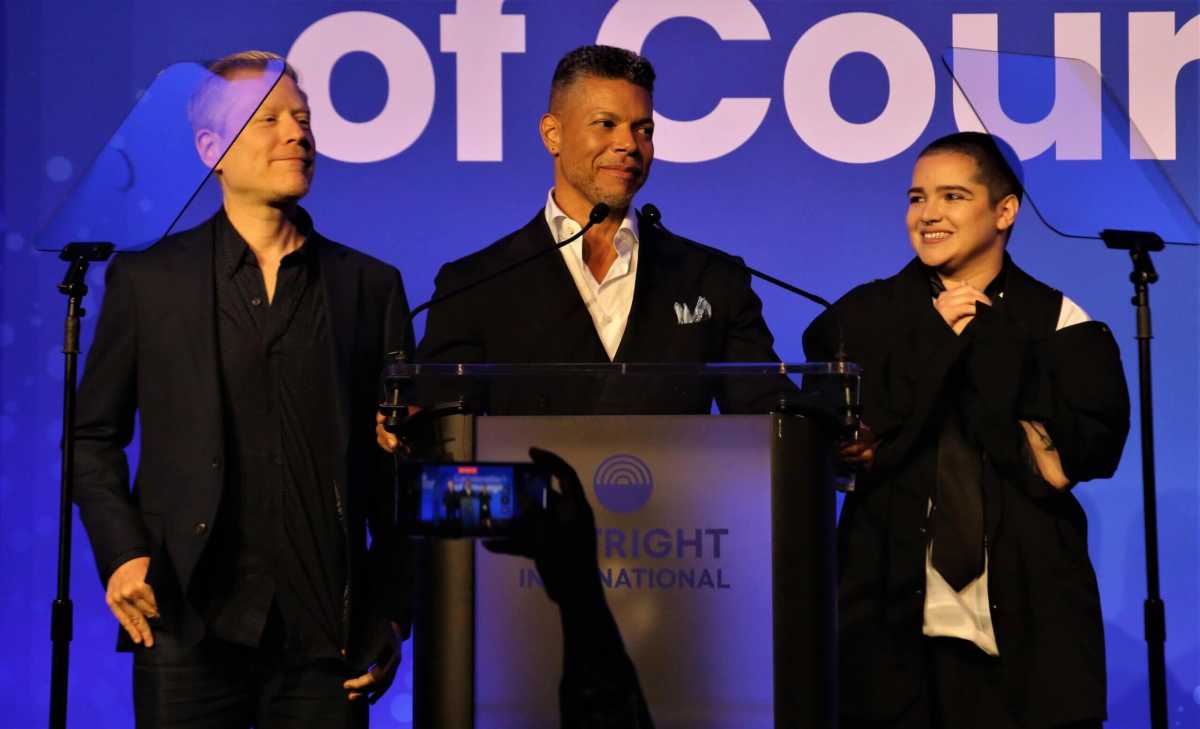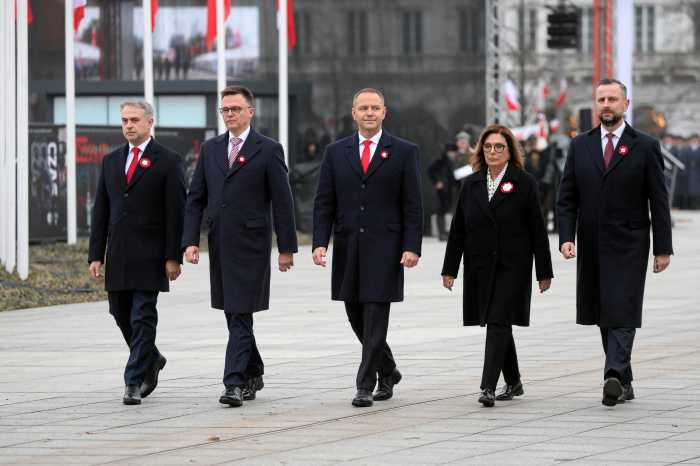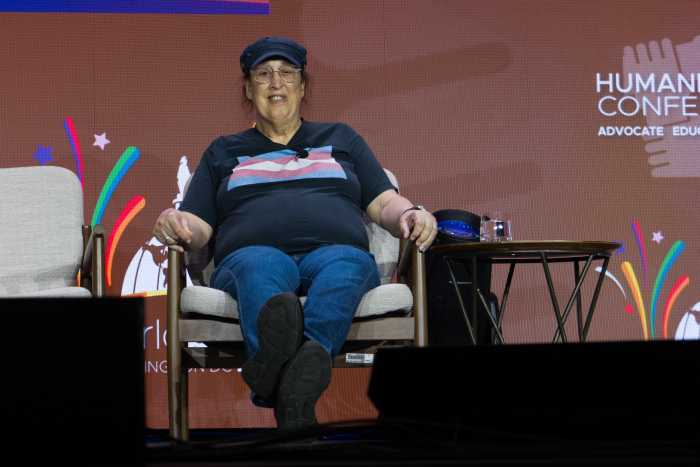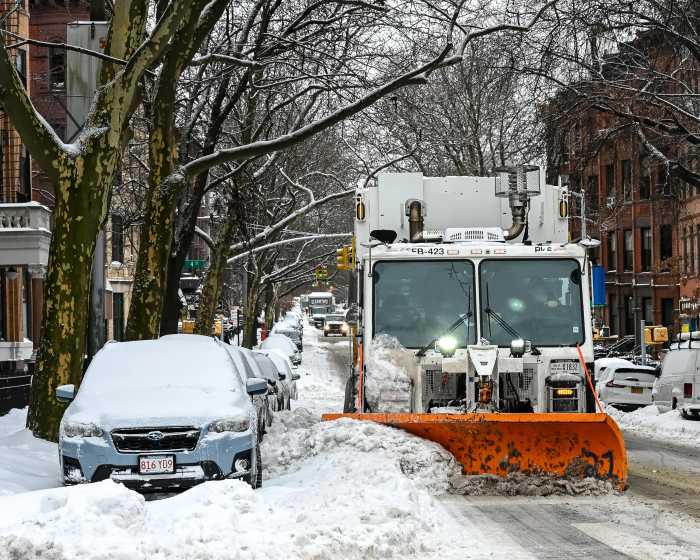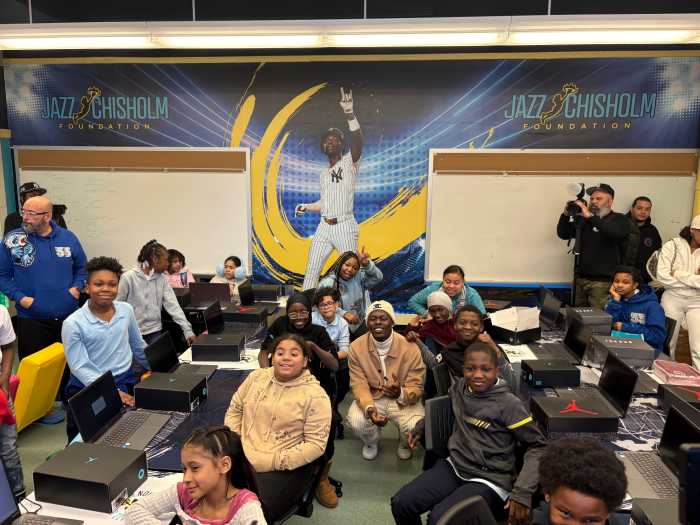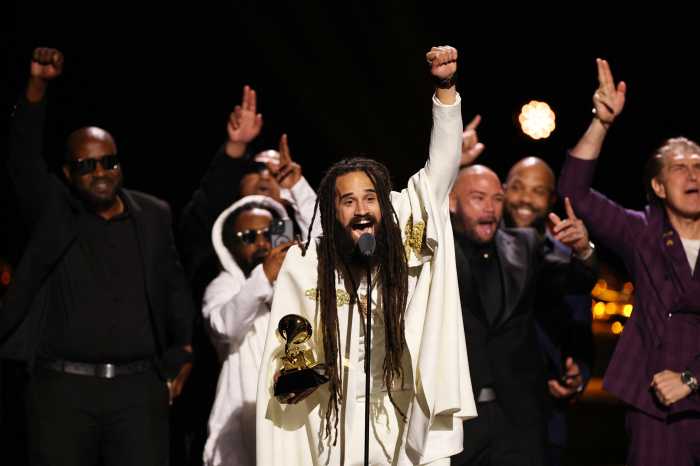The glamorous headliners came from across the galaxy, hoping the organization and those to whom it offered aid would live long and prosper. Indeed, Outright International’s 27th annual Celebration of Courage Awards, held at Pier 60 on New York’s West Side on June 5, went where the awards show had never gone before: The organization raised $1 million dollars in a single night.
Three awards were given out that evening. The Eastern Caribbean Alliance for Diversity and Equality (ECADE) received the Felipa de Souza Award for its groundbreaking work in repealing colonial era anti-LGBTQ+ laws. Google’s philanthropy division, Google.org, would receive the Outstanding Award. In addition, the Outspoken Award was given to queer members of the cast and production team of “Star Trek: Discovery,” which takes LGBTQ+ themes into outer space. Celebrities who came on stage for the award included Wilson Cruz, Anthony Rapp, and Blu del Barrio, with production members and many other Trek celebrities on hand.
The host for the event was Bebe Zahara Benet, the inaugural winner of “RuPaul’s Drag Race” and star of TLC’s “Dragnificent” and the documentary “Being BeBe.”
Throughout the evening, there were constant reminders of the urgency for LGBTQ people, not only around the world — with Uganda especially highlighted — but right here at home in the United States under the current political climate.
On that theme, out gay actor Wilson Cruz, who plays a gay scientist on “Discovery,” told Gay City News, “You can’t come to this event this year, and say how terrible things around the world and not actually understand how terrible things are here. There is a climate here of hate. There is a real attempt to turn the clock back to a time when LGBTQ people were ashamed of who they were.”
“Our fight here, while not as dire as it is in places around the world, like Uganda and Russia, or even the Eastern Caribbean, is still fraught, and we have our work to do,” Wilson added. “And so, I ask people to step up to take up the work of Frank Kameny, of Sylvia Rivera, Marsha P. Johnson, and understand that we get the opportunity now to continue their work. Because we were expecting this backlash.”
Rikki Nathanson, Outright’s senior advisor on transgender issues, also focused on this backlash. Nathanson told Gay City News that Pakistan reversed a bill that protected the lives of trans people.
“As far as that we’ve had many advances, that was a huge, huge blow to the trans community globally,” Nathanson said. Still, she added, “look what’s happening in the United States, all these anti-trans bills.”
In her speech, Nathanson furthered this, explaining how she came to the United States as a refugee from Zimbabwe because of persecution, yet “the current wave of hatred across several African countries shows just how much oppression we continue to face. We heard about Uganda, but there are several countries in the region with similar bills pending. In the United States, supposedly the land of the free that I came to, over 500 anti-trans bills have been introduced.”
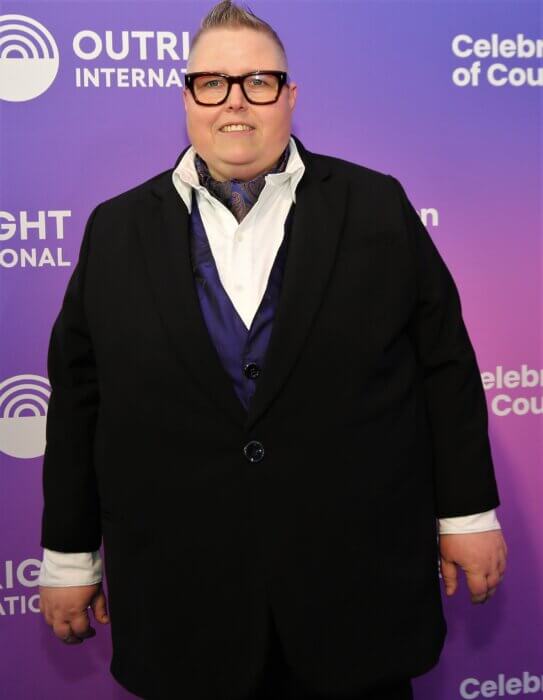
Maria Sjödin, executive director of Outright International, explained to Gay City News that many of the worst developments in the United States impact the world, especially as conservative American churches further homophobia in Africa.
“We have seen, for example, American evangelicals traveling to East Africa, and inviting leaders from East Africa and other parts to the US, too, to shape this narrative that somehow LGBTQ people are a danger to society.”
The urgency of the crisis in Uganda, where extreme laws were passed persecuting LGBTQ+ citizens, was a major topic that evening. The law encourages families to report their LGBTQ+ members and for landlords to evict LGBTQ+ residents, forcing them into homelessness, among other onerous aspects. Among the guests was the Ugandan LGBTQ rights activist Kasha Jacqueline Nabagesera, who told Gay City News of the law’s impact.
“People are really being harassed, being evicted,” Nabagesera said. “I have proof of evictions. I have people, parents, who are saying to get out.”
Being in New York for the event was, in some ways, a brief reprieve.
“Right now, for me to have a breather to be in a space like this one, where I am with supporters, gives me strength,” she said, adding she is continuing to petition the government to change the new law.
While the evening highlighted horrors, it also honored progress. This especially included the Eastern Caribbean.
Kenita Placid, ECADE’s executive director, highlighted advancements in Barbados, which after becoming a Republic and separating from the Commonwealth, subsequently repealed the law criminalizing same-sex acts.
“We are going in a good direction,” she commented, adding that tourism played a role where “Barbados was the first country even during COVID to look at these packages that allow LGBT families to move over for a year to work away from home. And so, I think they are pretty much more progressive.”
The contrast of a glamorous gala in a city like New York with Outright’s on-the-ground work was not lost on some attendees. Among them was Elliot Vaughn, Outright’s London-based board co-chair. He and Kathy Teo, based in Singapore, are the first Outright Chairs based outside of the United States. Vaughn called the work ECADE does “Nobel Prize worthy,” adding that a gala in New York is how “we hold that tension, because we know we’re acutely conscious that there are so many people still working for their fundamental freedoms around the world, and unable to actually celebrate Pride Month as we’re doing here in New York.”
Vaughn said such events help Outright International’s profile grow, and in particular, for this year’s event, to pair with celebrities like those from Star Trek.
“Sharing a stage with the cast of “Star Trek: Discovery,” you might say, that’s strange, but actually, they are creating space for people to live more free lives around the world. What I think a lot of people love about Star Trek is that sort of ability to envision a different world, literally where you can be yourself and be accepted. And that is really powerful.”
Jess Bush, one of the Star Trek celebrities from Australia — which hosted World Pride in Sydney earlier this year — also reflected on this contrast.
“It feels like we carry a big responsibility, as members of the first world, to remain cognizant of how other countries might take a little longer to get where we are, and to remain open and allow for gray areas to be present as they kind of reach where we are,” Bush said.
The reality that Star Trek, while science fiction, has been at the forefront of civil rights issues, including the first interracial television kiss in 1968, was expressed by cast members.
There was a certain irony as to why the Star Trek celebrity quotient was also so high, according to another “Strange New Worlds” actress, Melissa Navia, who told Gay City News “we wouldn’t all be here” if it were it not for the Hollywood writers strike, as they were not in production.

In his speech accepting the Outspoken Award, Cruz told the audience that “this new generation of Star Trek reflects and contends with the challenges and opportunities of our time, and finds that the answers and solutions have only ever been found in each other. On ‘Discovery,’ we are the heroes of our own stories. No one saves us, we save our own lives.”
He explained that the show reflects real-world challenges for LGBTQ+ people. All of this, he said, is why “Star Trek: Discovery” calls on us to do the hard thing to remember who we are, and commit ourselves to the work of realizing our collective mission of creating a multicultural and multiethnic world in which everyone’s humanity is respected, and everyone’s voice is heard, valued, and needed.”
Bringing ideas from fiction into reality requires money. Sponsors included Disney, currently under attack by Florida Governor Ron DeSantis. Mention of their involvement received one of the most enthusiastic applauses.
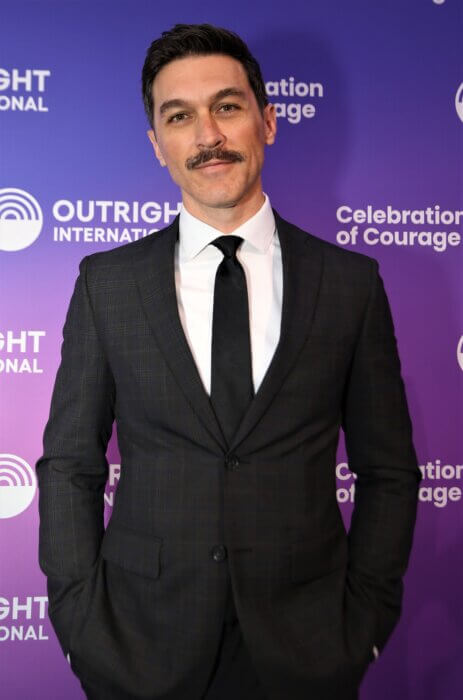
The Outstanding Award focuses on corporate impact. Outright board director Lanaya Irvin told the audience that Outright’s partnership with Google.com “has demonstrated an extraordinary commitment to advancing LGBTIQ, visibility and equality, promising to bring the best of Google to help solve problems of humanity’s biggest challenges.”
“We must recognize how much more work there is to do,” Google’s Diversity, Equity & Inclusion chief, James Heighington, told the audience when accepting the award. Current research supported by Google.org has found that LGBTQ nonprofits are significantly underfunded.
“Given all of the ways that this community is persecuted, is marginalized, is attacked and threatened, it is absolutely vital that we increase our support,” Heighington added.
Heighington had earlier told Gay City News how important it was for corporations to contribute to social good. He added that Google, as an internet company, had a particular responsibility, stating, “I see the internet as a lifeline for LGBTQ people. I see it as a way to form connections. I see it as a way to view role models that you might not be able to traditional media, to educate yourself… to learn to have a safe place that you can ask questions, at a time when you might not be ready to come out and need to actually get that information. So, I think ensuring there is a free and open Internet is vital for the LGBTIQ community.”
How did the evening become a million-dollar event? Much of it was due to auctioneer Harry Santa-Olalla, and his humorous, yet serious pleas for money from the audience. Donations ranged from as high as $50,000 to a round of $100 specifically for Uganda, which was matched by an individual donor to double those funds. When Sjödin was closing out the evening and announced that about $975,000 was raised, a representative from Deutsche Bank made a $25,000 donation to round the figure to a million dollars.
Beyond the United States and Uganda, the evening was, in many ways, also a reminder of how changes in one location impact others. Teo is based in Singapore at a time when in Asia is rapidly changing, as the global superpower China increases oppression in Hong Kong, causing companies and people, including LGBTQ people, to flee from there to this small city-state.
Sjödin had also told Gay City News that superpower global shifts can impact LGBTQ+ rights, discussing the Taliban retaking of Afghanistan when the United States pulled out. Outright published papers on how the US pullout created a crisis for the LGBTQ community and women, with many unable to leave the country.
“I really think every country needs to step up and receive refugees, especially from vulnerable groups, including LGBTQ people,” Sjödin said.

